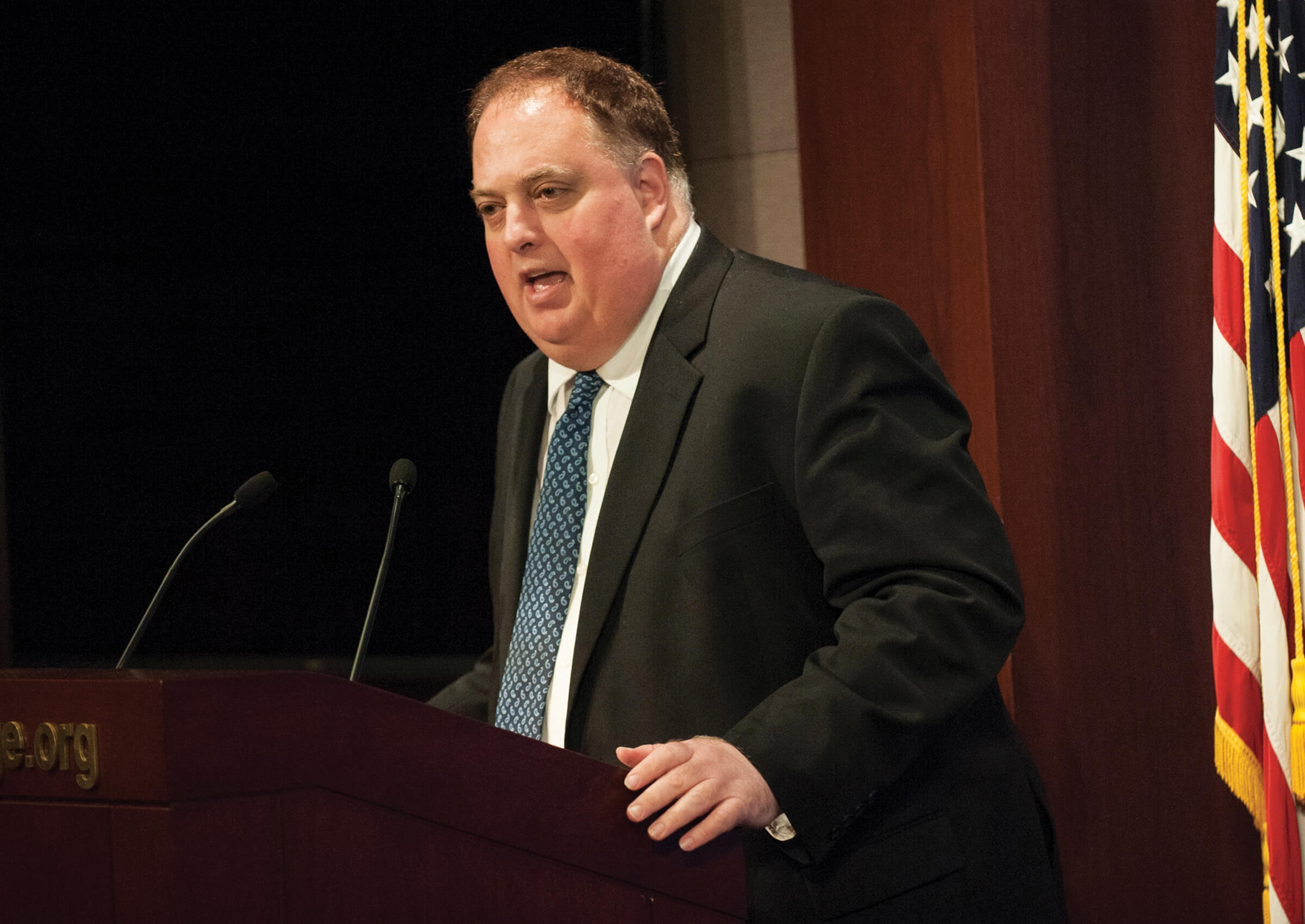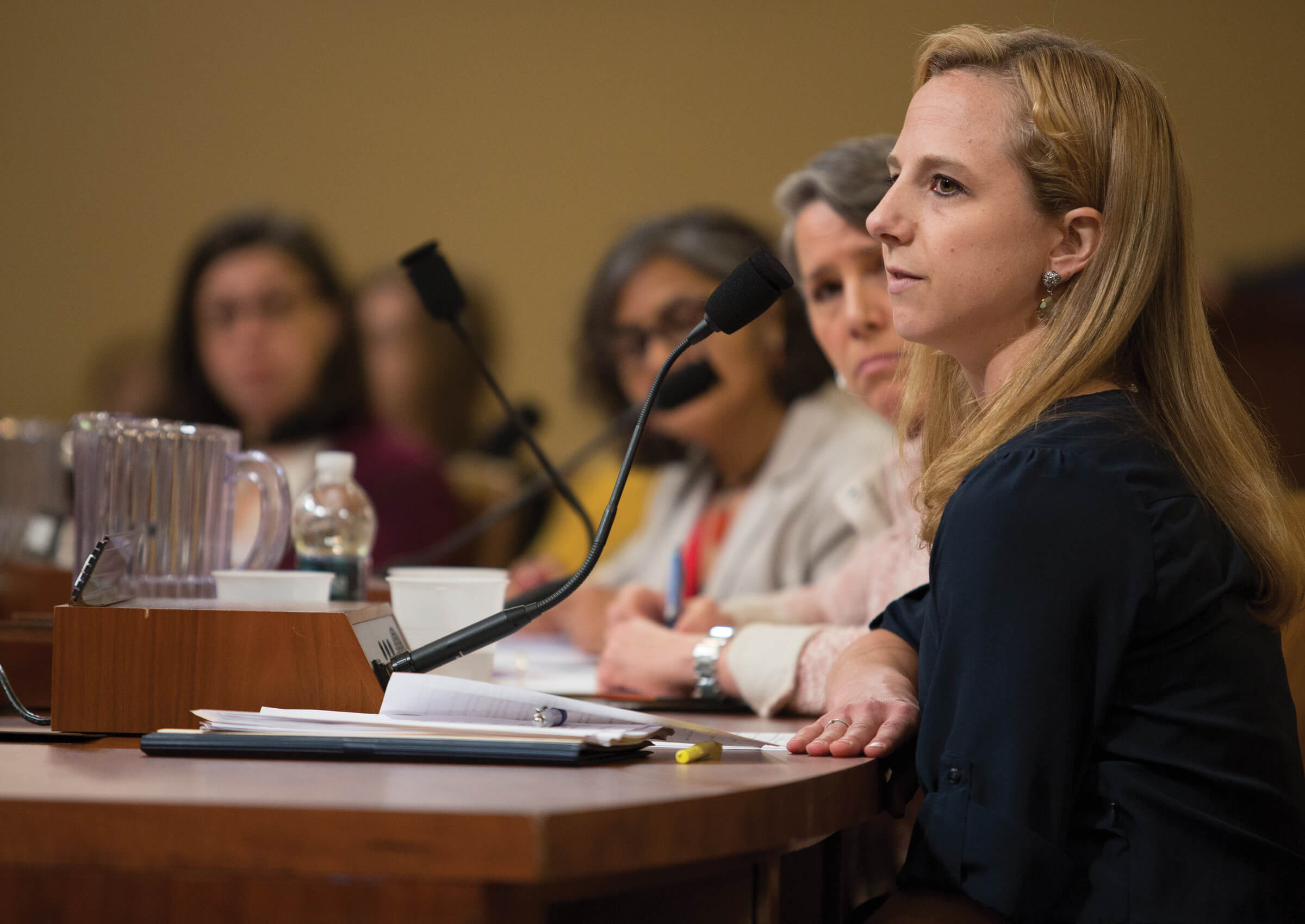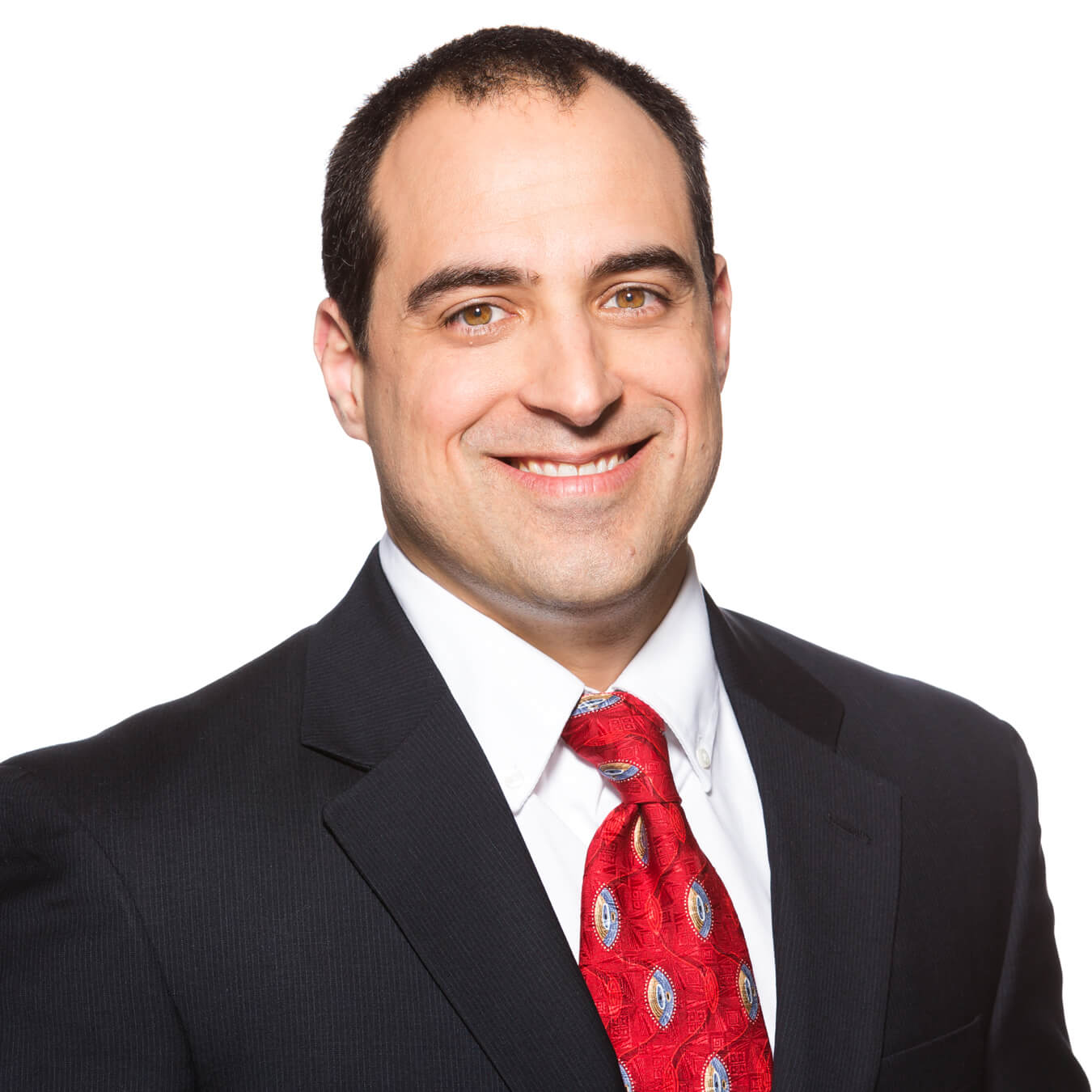2019 Annual Report
Principled Leadership in a Challenging World
The Institute for Economic Freedom
Nicolas Loris
Deputy Director, Thomas A. Roe Institute for Economic Policy Studies, Herbert and Joyce Morgan Fellow
Follow: Twitter
When New York Rep. Alexandria Ocasio-Cortez unveiled her “Green New Deal,” many conservatives simply scoffed at its unrealistic ambitions. Not Nicolas Loris.
He knew that even the most outlandish proposals eventually become “mainstream” if left unchallenged.
The deputy director of our Thomas A. Roe Institute for Economic Policy Studies, Loris spent much of 2019 combating the Left’s climate agenda. Working with Kevin Dayaratna, the senior statistician of our Center for Data Analysis, Loris determined that, by 2040, the Green New Deal would cost us more than $3.9 trillion in GDP, more than 1.4 million jobs, and $40,000 in family income, while also sharply increasing electricity costs.
In return, the American people would get virtually nothing. In Loris’ words, “Even by the end of the century, the ‘deal’ would make no discernible difference in global warming.” Worse, he argued, “it would leave us less equipped to deal with actual climate-related problems, with fewer resources to mitigate risks from extreme weather.”
Loris spread the word about his findings, testifying before four different congressional committees, conducting more than 20 congressional staff briefings, publishing more than 50 op-eds, and appearing on scores of radio and TV news programs.
Dayaratna also testified on this issue, in state committee hearings as well as on Capitol Hill. His testimony in Oregon contributed to the demise of a “cap and trade” proposal there.
Back in D.C., Loris’ work earned admiration at 1600 Pennsylvania Ave. In July, the White House invited him to attend President Donald Trump’s major policy address outlining his vision of responsible leadership and environmental stewardship.
In November, Loris got more good news from the administration when Secretary of State Mike Pompeo gave the U.N. formal notification that the U.S. was pulling out of the 2015 Paris climate agreement. Loris had campaigned against the pact since its inception, exposing its many flaws and explaining why it was doomed to fail—an unworkable “non-solution” that would succeed only in lowering living standards around the world. The withdrawal will be complete Nov. 4, 2020.
Defending Capitalism and Free Markets
The progressive agenda doesn’t stop with the Green New Deal. Last year saw many liberal leaders openly embrace socialism and blithely propose $40 trillion spending plans. The need to defend America’s economic prosperity has never been more urgent.
One of those to answer the call was Roe Institute Senior Fellow David Burton. He penned a remarkable Backgrounder titled, “It Is Arithmetically Impossible to Fund the Progressive Agenda by Taxing the Rich.” That report was picked up by Fox Business, Newsmax, The Washington Times, and many other outlets. Syndicated radio host Mark Levin even read Burton’s irrefutable findings on the air.
With a 17-part lecture series titled, “Free Markets: The Ethical Economic Choice,” Burton also systematically rebutted the notion that socialism is morally superior to free market capitalism. Among the speakers were Georgetown University’s Randy Barnett (“The Constitution and Economic Freedom”), Wake Forest University’s James Otteson (“Justice vs. Social Justice”), and McDonough School of Business’ Jason Brennan (“Fake Socialism vs. Real Capitalism”). Burton himself contributed a lecture, “Economic Equality Is Unjust.” All 17 speeches will be compiled in a book to be published in 2020.
Our Institute for Economic Freedom fought a year-long battle debunking the Left’s false narrative that lower taxes and deregulation serve only to “line the pockets of the rich at the expense of the poor.”
So, for example, when CBS News ran a story claiming “middle-class Americans are falling behind” because of the 2017 tax cuts, Distinguished Visiting Fellow Stephen Moore dug into the data. He found that real median household incomes had shot up by more than $5,000 since January 2017—five times the increase logged during the previous administration.
Reporting these findings in his nationally syndicated column, Moore argued convincingly that the tax cuts and regulatory rollback have helped turbocharge household incomes for the vast majority of Americans. “It’s a middle-class boom,” he proclaimed.
Indeed, he noted, the economy as a whole was performing far better than the “experts” predicted. Before 2017, for example, the Congressional Budget Office predicted net job growth of no more than 2 million from 2017 through 2019. The actual result: 7 million.
Senior Research Fellow Daren Bakst outlines common-sense reforms to farm subsidy programs at a June 11 event.

Senior Research Fellow Daren Bakst outlines common-sense reforms to farm subsidy programs at a June 11 event.
Shedding Needless Regulations
Heritage continued to make progress in our fight to eliminate unnecessary regulation. Senior Research Fellow Daren Bakst published a commentary on the Environmental Protection Agency’s secondary benefits rule, arguing that the agency should make sure its regulatory proposals do more good than harm.
That common-sense recommendation struck a chord with EPA Administrator Andrew Wheeler. He subsequently issued a memorandum directing four of the agency’s policy offices to make sure that, in the future, they address cost-benefit analyses used in their rule-making process.
In mid-August, Bakst scored again—this time in court. A federal district court judge ruled that the Obama administration’s Waters of the U.S. rule violated both the Clean Water Act and the Administrative Procedure Act. With encouragement from Bakst and others, the Trump administration had already declared its intent to withdraw the rule. Two weeks after the court decision, the rule was gone.
The EPA also withdrew the Obama administration’s preemptive rejection of the Pebble Mine project—a prospective gold and copper mining operation in Alaska. For years, Heritage had urged the agency to obey the law—i.e., wait until it got an actual mining proposal—and then follow the environmental review process—before deciding whether or not mining could begin.
In another welcome reversal, the Department of Energy withdrew Obama-era energy efficiency mandates for certain light bulbs—a decision long advocated by Heritage. The mandates would have been a de facto ban on incandescent bulbs. Now, however, consumers are once again free to choose the type of lighting they want, rather than have their options artificially restricted by government fiat.
Senior Research Fellow James Gattuso also made a difference on the regulatory front. The Federal Railroad Administration wanted to ban one-person train crews. Gattuso argued that technological advances now make it possible to run freight trains safely with only one person on board.
His Issue Brief critical of a proposed regulation governing the size of railroad crews was circulated widely within the railroading community. In late May, the agency withdrew the proposal, opening the way to lower transportation costs for America’s farmers, miners, and steelworkers.
Crafting Real Budget Reforms
Heritage’s influence was also evident in President Trump’s budget proposal. It included a discussion and analysis of the 24 largest tax expenditures under a consumption tax baseline. Heritage had recommended that in the previous year’s Blueprint for Balance and reiterated the utility of such a discussion as part of a brief we had submitted to Office of Management and Budget Acting Director Russ Vought (an alumnus of Heritage Action).
Following up on one of the Blueprint’s recommendations, our Grover M. Hermann Center for the Federal Budget, a specialty center within our Roe Institute, argued strenuously against extending some 30 supposedly temporary tax subsidies in the spending package.
“For legislators with ears to hear and eyes to see, The Heritage Foundation this week published its “Blueprint for Balance,” an annual analysis pointing to where budgeters can find savings to reduce waste, duplication and fraud.”
Initially dropped from the package, the extenders were slipped back in at the last minute—but in a less egregious form. The good news: Our research helped keep the existing credits from being expanded, and the extensions are short, lasting only through 2020. That creates an opportunity for us to fight again—and win—next year.
Like its predecessor, the 2019 Blueprint for Balance (for FY 2020) recommended reforms for virtually every federal department and every program, from Social Security to health care. It would cut federal outlays by $9.9 trillion over a decade, resulting in a balanced budget by 2029, if not earlier, while protecting our nation’s most vulnerable citizens.
In May, the Republican Study Committee’s FY 2020 budget proposal embraced 132 of the Blueprint’s more than 250 reforms, including 23 of 32 significant changes to entitlement programs.
That same quarter, Republican Sens. Mitt Romney (Utah), Mike Lee (Utah), Mike Braun (Ind.), and Pat Toomey (Pa.) introduced the Budgeting for Disasters Act. The act would codify the Blueprint’s recommendation that future disaster and wildfire relief funding fall within statutory budget caps.
Two of the Hermann Center’s recommendations to expand individuals’ access to funds in their retirement savings accounts—including early 401k withdrawals for Paid Family Leave—were included in the Secure Act passed by the House.
Just eight days into 2019, the center made waves in Washington when Sen. Braun introduced S.39, the No Budget, No Pay Act. The bill reflects a “hit ’em where it hurts” policy proposal developed by Director Romina Boccia. Specifically, it states that “Members of Congress may not receive pay after October 1 of any fiscal year in which Congress has not approved a concurrent resolution on the budget and passed the regular appropriations bills.”
Inspired by another Hermann Center proposal, Rep. Kevin Brady, R–Tex., and Indiana Republican Sens. Braun and Todd Young introduced the Maximizing America’s Prosperity Act. The bill would cap federal spending, then require Congress to cut any spending above those caps. Boccia modelled her recommendation after a Swiss law that has proved a remarkably effective brake on the country’s federal expenditures.
Moving the Technology Forward
Our Center for Data Analysis continued to advance the art of economic computer modelling. Its groundbreaking analysis of the Green New Deal took the wind out of the sails of that socialist pipe dream.
The center also perfected a macro-simulation model that allows it to do a “dynamic” assessment of tax and spending proposals. The dynamic analysis showed that the reduced spending proposals outlined in our Blueprint for Balance would actually balance the federal budget four years earlier than predicted by old-school “static” analysis.
Our micro-simulation model for personal taxes helped push along the 2017 tax cuts by demonstrating just how much the constituents of every congressional district stood to gain. In 2019, the center completed a new micro-model for corporate taxes. No other think tank has a model this advanced. It will allow us to provide lawmakers with much richer analyses of corporate tax changes in areas such as expensing and asset depreciation.
The Center for Data Analysis also completed a new model to estimate the budgetary effects of allowing Universal Savings Accounts—an innovation Heritage has recommended to boost personal savings.
Making a Difference on the Homefront, Too

Rachel Greszler testifying before Congress in May.
Some people make a difference in their hometowns. Some move policy in Washington or on the international stage. In 2019, Rachel Greszler had success in all three arenas.

